India election results 2024
Counting of over 640 million votes that were cast in the 2024 Indian general elections began early Tuesday morning. Narendra Modi is ahead but markets plunge as landslide predictions fade as elections results are being declared.
Get live updates on India Election Results below-
8:36pm, June 4
Official results declared
In the handful of seats declared so far by the Election Commission of India, the results are:
Bharatiya Janata Party 203 seats
Indian National Congress 79 seats
The rest were won by smaller parties. We will update as new figures come in.
9:36pm, June 4
Modi should resign immediately: Mamata
Buoyed by Trinamool Congress' impressive show in parliamentary elections in West Bengal, Chief Minister Mamata Banerjee today said Prime Minister Narendra Modi should immediately resign "accepting the moral defeat".
Modi campaigned in the Lok Sabha polls claiming BJP would win over 400 seats but in reality, it failed to get a majority on its own, said Mamata, reports our New Delhi correspondent.
Google News LinkFor all latest news, follow The Daily Star's Google News channel.
Addressing a press conference in Kolkata, Mamata said she would try to ensure that Modi is out of power from the Centre and the "INDIA bloc is in".
"PM Modi has lost all credibility, he should immediately resign. India has won, Modi has lost. The PM broke many parties and now people have broken his morale. Modi is now falling at the feet of TDP and Nitish [Kumar] to form the government," she said.
8:20pm, June 4
'A huge message' - Gandhi
The opposition INDIA alliance led by Rahul Gandhi's centrist Congress party, was leading in over 230 seats, higher than expected. Congress alone was leading in nearly 100 seats, almost double the 52 it won in 2019 - a surprise jump that is expected to boost Gandhi's standing.
"The country has unanimously and clearly stated, we do not want Narendra Modi and Amit Shah to be involved in the running of this country, we do not like the way they have run this country," Gandhi told reporters, referring to Modi's powerful number two, Home Minister Shah. "That is a huge message."
Gandhi said Congress would hold talks with its allies on Wednesday and decide on the future course of action, when asked if the opposition would try to form a government.
8:30pm, June 4
Modi declared victory
"The people of the country have expressed their trust in the NDA for the third consecutive time.
"This is an unprecedented moment in the history of India.
"I thank my family for this love and their blessings. I assure the countrymen that we will fulfil their aspirations, we will move forward with new energy, new enthusiasm and new resolve.
"I express my heartfelt gratitude and congratulate all the party workers for the dedication and tireless hard work they have done."
7:30pm, June 4
BJP concedes defeat in Ayodhya, where Modi opened grand Ram temple
India's ruling Bharatiya Janata Party conceded defeat in a constituency where the inauguration of a grand Hindu temple by Modi was seen as an event that would cement his legacy and the party's poll victory.
The BJP looks set for heavy losses in the bellwether northern state of Uttar Pradesh, Saurabh Sharma and Shivam Patel write, as the opposition Samajwadi Party and Congress race ahead in more than half of its 80 seats.
This includes in Ayodhya city in the Faizabad constituency where Modi inaugurated the temple in January.
The opening of the temple dedicated to god-king Lord Ram, on a site previously contested by India's minority Muslims, fulfilled a three-decades old BJP promise which it mentioned in almost every campaign rally during the massive two-months long vote in the Hindu-majority country.
"I could not protect your and Ayodhya's dignity, there must have been some shortcoming in me," Lallu Singh, the BJP's incumbent lawmaker from Faizabad, told party workers, according to footage shared by the Indian Express daily.
"There must have been some reason that we couldn't win in the Ayodhya parliamentary region.
6:02pm, June 4
What has Modi's party promised if they return to power?
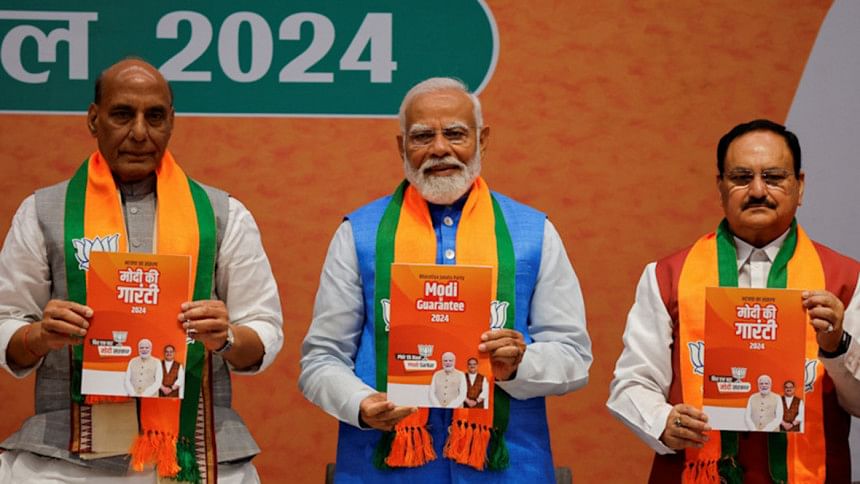
UNIFORM CIVIL CODE
The BJP's manifesto promised a national code that will replace religion-specific civil laws in the country, a move many from the Muslim minority say is aimed at curbing centuries-old religious practices it follows.
TEMPLES AT DISPUTED SITES
After Modi inaugurated a temple to the Hindu God Ram at Ayodhya earlier this year, party leaders have said another emphatic electoral victory would help them to build temples on other disputed sites. This stems from their belief that Muslim invaders built mosques over demolished Hindu temples.
Courts are hearing cases against two mosques in BJP-run Uttar Pradesh state: in Modi's Varanasi constituency and in Mathura.
ONE NATION, ONE ELECTION
Modi's party has promised to implement an official report recommending elections to India's 28 state assemblies and national parliament at the same time, every five years.
A government-appointed panel in March said holding simultaneous elections would improve governance and growth, but Modi's opponents say it violates the federal system guaranteed in India's constitution.
ECONOMY
The BJP manifesto "guarantees" India will grow to become the third-largest economy in the world, from the fifth largest. The party promises to maintain high growth and low inflation while keeping the budget deficit under control. It also talks about boosting manufacturing and employment opportunities.
PEACE IN THE INDIAN NORTHEAST
Modi's party also promises to maintain peace in the nation's northeast, without mentioning the BJP-run and violence-torn state of Manipur where ethnic clashes have killed at least 220 people and displaced thousands.
5:40pm, June 4
Modi wins in his Varanasi seat – Election Commission
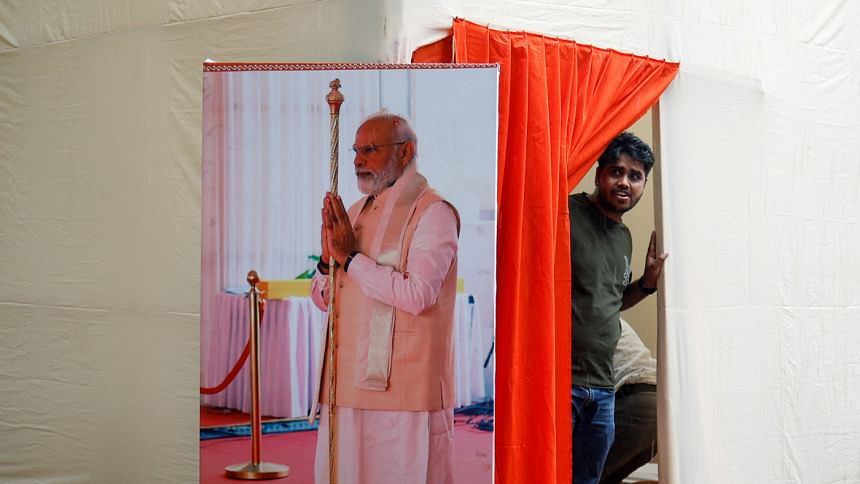
5:33pm, June 4
Where did Modi's support go, and what does it mean for markets?
On today's episode of Reuters World News daily podcast, Reuters' Tara Oakes spoke to Krishn Kaushik about what could be behind the disappearance of Modi's predicted landslide - and to Carmel Crimmins about what the results so far mean for markets.
Listen now:
5:33pm, June 4
Rahul Gandhi wins in Wayanad, Kerala seat – TV
5:26pm, June 4
Commentary: India may no longer be Narendra Modi's
India may no longer be Narendra Modi's. Indians handed the 73-year-old Modi a chance to lead the country for another five years but likely robbed his Hindu nationalist Bharatiya Janata Party of its absolute majority, and him of a strong grip over the world's fifth-largest economy. Even if he is able to form the next government, it ends a decade of extraordinary stability.
The BJP was leading in 238 seats in the 543-member lower house of Parliament as of 1000 GMT on Tuesday, or about 295 with its partners, failing to hit the halfway mark on its own. The opposition INDIA alliance led by Rahul Gandhi's centrist Congress party was leading in 231 seats. Should Modi's regional allies ditch him, India could see a new leader.
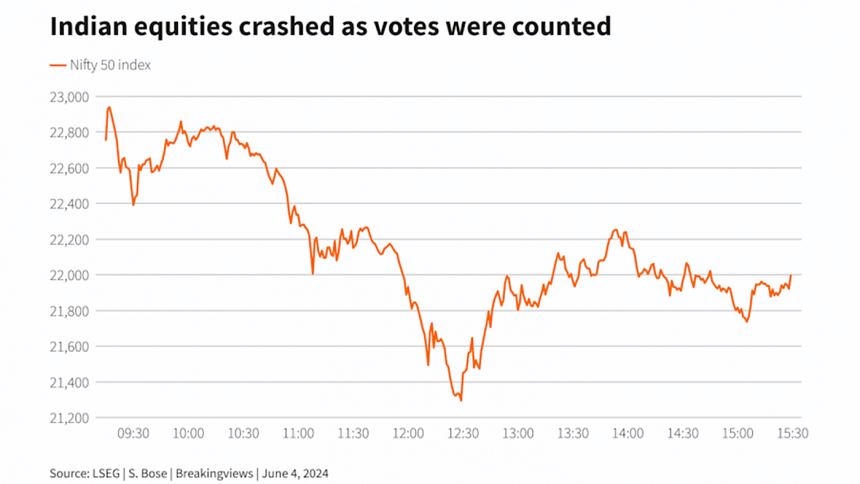
There are multiple reasons for the BJP to cede seats. Voters tend to turn on incumbent politicians. What's more, India's world-beating GDP growth is not trickling down to the masses fast enough: after a decade of Modi, most of the population are still poor enough to qualify for the government's free food scheme – laying bare the deep distress in rural incomes.
Read the full commentary here.
Reuters Breakingviews is the world's leading source of agenda-setting financial insight. As the Reuters brand for financial commentary, we dissect the big business and economic stories as they break around the world every day. A global team of about 30 correspondents in New York, London, Hong Kong and other major cities provides expert analysis in real time.
5:05pm, June 4
Why are markets spooked?

More than half way through the count, Modi's right-wing Bharatiya Janata Party (BJP) was falling short of a majority of its own in the 543-member parliament, the trends showed.
The Hindu nationalist BJP won a majority of its own when it swept to power in 2014, ending India's era of unstable coalition governments, and repeated the feat in 2019, Sarita Chaganti Singh and Shivangi Acharya report.
Having to depend on allies to form the government could introduce some uncertainty in policy-making, as Modi has ruled with an authoritative hold in the last decade.
The prospect of Modi having to rely on allies spooked markets with stocks falling steeply. The blue-chip NIFTY 50 was down 4.8% and the S&P BSE Sensex was down 4.7% at 0833 GMT.
TV exit polls broadcast after voting ended on June 1 projected a big win for Modi, but exit polls have often got election outcomes wrong in India. Nearly one billion people were registered to vote, of which 642 million turned out.
However, if Modi's victory is confirmed even by a slim margin, his BJP and its allies will have triumphed in a vitriolic campaign in which parties accused each other of religious bias and of posing a threat to sections of the population.
4:55pm, June 4
Two BJP's alliance partners endorse Modi's third term
Spokesmen of two regional political parties allied with Modi's BJP said they "endorse Modi as the prime minister for third term."
4:44pm, June 4
Congress claims victory over BJP government minister Smriti Irani
A Congress party candidate, Kishori Lal Sharma, has claimed victory over Smriti Irani, a minister in Narendra Modi's government and a former TV actress. They were contesting the seat of Amethi in the northern state of Uttar Pradesh. Irani has not publicly conceded and the outcome has not been confirmed by election authorities.
4:15pm, June 4
The rupee fell the most in more than a year
The rupee closed at 83.53 against the U.S. dollar, down 0.47% on the day, its worst single-day percentage fall since February last year.
The Reserve Bank of India (RBI) likely stepped in to limit the rupee's decline, traders said.
India's blue-chip NIFTY 50 stock index provisionally ended the day around 5.93% lower.
4:07pm, June 4
Rahul Gandhi wins family bastion seat - report
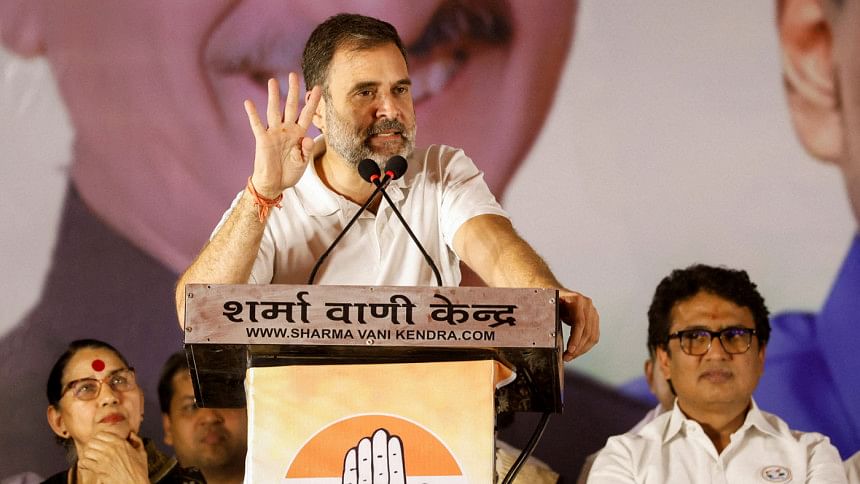
India opposition Congress party leader Rahul Gandhi won his family bastion seat in Raebareli, according to the national daily Indian Express.
4:06pm, June 4
Political analysts' views
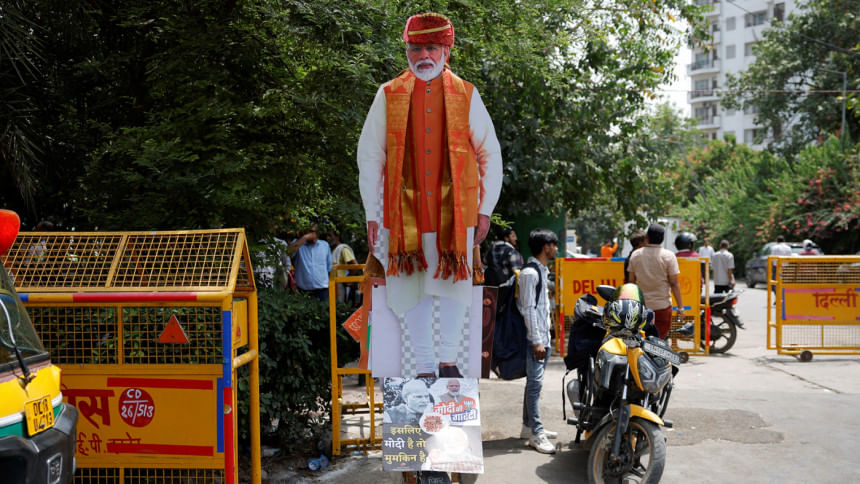
Reuters team spoke with some political analysts:
Yashwant Deshmukh, founder of polling agency CVoter Foundation
"BJP and NDA's seat share is lower-than-expected. There is only one state that has gone completely off the charts in our data: Uttar Pradesh. And that has pulled down the BJP's own tally as well and this is the reason they are unable to touch the majority mark on their own at this point of time.
"BJP's two allies have become extremely important now - Chandrababu Naidu and Nitish Kumar - now that BJP might not get its own majority."
Rasheed Kidwai, visting fellow, Observer Research Foundation
"I think there was a lot of economic issues. The BJP has performed badly in rural areas. There was lot of defection and manoeuvring that happened in Maharashtra that boomeranged. Too much reliance on Modi did not work."
"This trend shows Modi can be beaten and regional party has come as a big force."
Sandeep Shastri, national coordinator, Lokniti
"The decline in the seats of the BJP is linked to three states, which are Uttar Pradesh, Maharashtra and Rajasthan. In Uttar Pradesh particularly the construction and inauguration of the Ram temple did not become a big issue. The social coalition made by Samajwadi Party and Congress seems to have made the difference as it was formidable."
Surendra Kumar Dwivedi, political analyst in Uttar Pradesh
"The trend very clearly shows that in a state like Uttar Pradesh, which has Ram Temple, the temple is not the only deciding factor any more and developmental issues especially, which are related to youths - like rampant leaks of the competitive examination (services) and unemployment - had made an impact on the youths, who were the largest chunk of voters."
3:52pm, June 4
Top Kashmiri politicians concede
In a suprise outcome, Omar Abdullah, a former chief minister of Jammu and Kashmir, has already conceded defeat to an independent candidate.
Abdullah is one of the most prominent Kashmiri politicians in recent decades and hails from a political dynasty, his father was also chief minister of the Himalayan region.
The man he conceded to, Sheikh Abdul Rashid, also known as Engineer Rashid, is currently serving a jail sentence under the Unlawful Activities (Prevention) Act.
He is accused of allegedly funding terrorist or militant activities in Kashmir, a region disputed between India and Pakistan.
Rashid has denied all charges levelled by the federal investigations agency.
Rashid has been held in jail in Delhi. His campaign was run by his two sons in Baramullah, a Muslim-majority seat in the Kashmir region.
Baramulla is one of the three seats in the Kashmir division, other than Srinagar and Anantnag-Rajouri, where Modi's BJP did not field any candidates.
Meanwhile, People's Democratic Party president Mehbooba Mufti also conceded defeat in the Anantnag-Rajouri seat to Mian Altaf, a member of Abdullah's political party. Mufti was also a former chief minister of Jammu and Kashmir.
3:49pm, June 4
Election uncertainty felt in foreign markets
US-listed shares of Indian firms fell premarket after voting trends showed a narrower lead for Modi's right-wing ruling alliance than expected.
3:44pm, June 4
Who is leading in the early vote count?
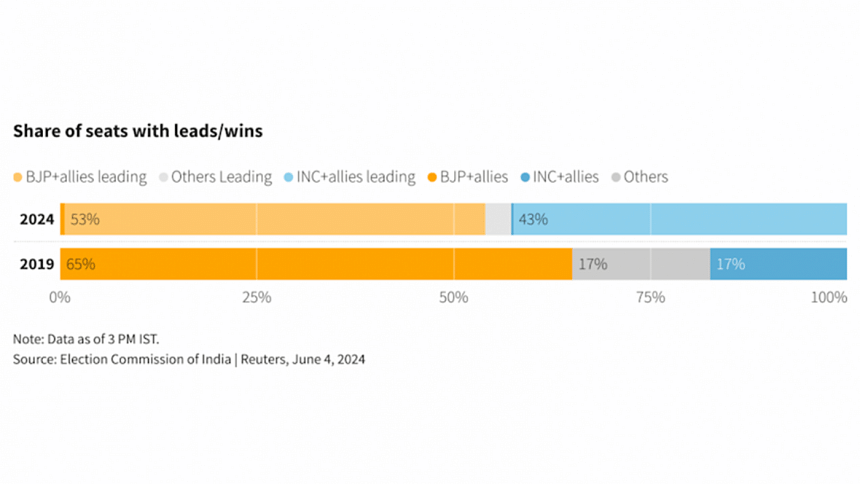
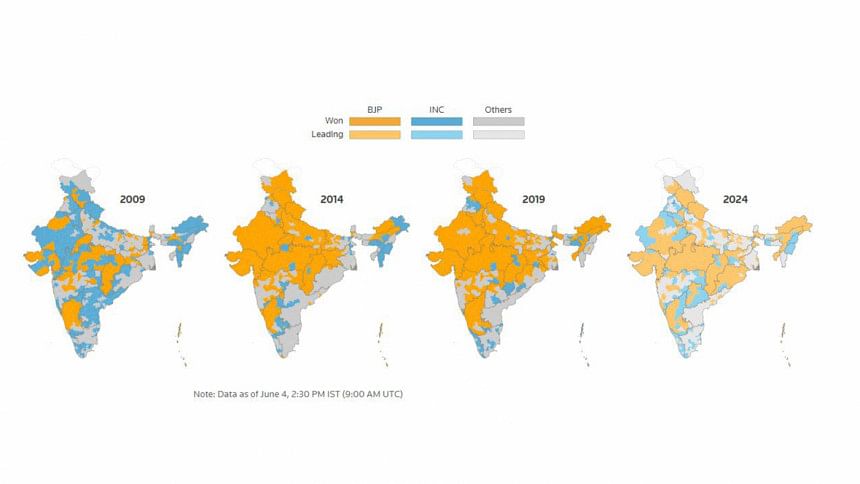
3:35pm, June 4
In case you've just joined us, here is the current state of play
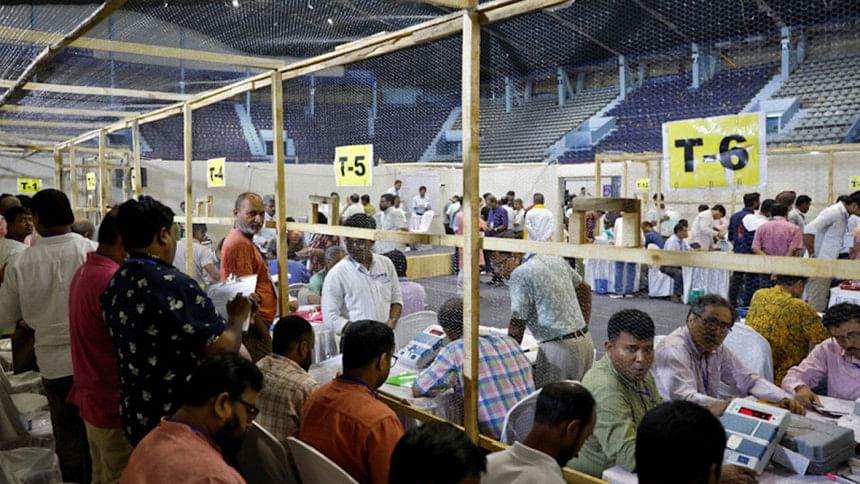
Prime Minister Narendra Modi's alliance was winning a majority of seats about halfway through the count in the general election on Tuesday, but the numbers were well short of the landslide predicted in exit polls, TV channels said.
Modi's own Bharatiya Janata Party (BJP) was falling short of a majority of its own in the 543-member parliament, the trends showed.
Having to depend on allies to form the government could introduce some uncertainty in policy-making as Modi has ruled with an authoritative hold in the last decade.
The Hindu nationalist BJP won a majority of its own when it swept to power in 2014, ending India's era of unstable coalition governments, and repeated the feat in 2019.
The prospect of Modi having to rely on allies spooked markets with stocks falling steeply. The blue-chip NIFTY 50 was down 4.8% and the S&P BSE Sensex was down 4.7% at 0833 GMT.
The rupee also fell sharply against the dollar and benchmark bond yields were up.
Politically difficult reforms
"A narrower-than-expected victory for Modi's alliance may raise doubts about the new government's ability to push through politically difficult reforms seen as crucial to sustain India's economic growth, which is already the world's fastest," said Vasu Menon, managing director of investment strategy at OCBC in Singapore.
"Despite this, the fact remains that the BJP-led alliance is still set to win a third term, which means continuity in the government's infrastructure and manufacturing-led drive to boost economic growth."
Markets had soared on Monday after exit polls on June 1 projected Modi and BJP would register a big victory, and the ruling National Democratic Alliance (NDA) was seen getting a two-thirds majority and more.
Early figures
At 0900 GMT, TV channels showed the NDA was ahead in nearly 300 of the 543 elective seats in parliament, where 272 is a simple majority, with about half the votes counted.
They showed BJP accounted for under 250 of the seats in which the NDA was leading, compared to the 303 it won in 2019.
The opposition INDIA alliance led by Rahul Gandhi's centrist Congress party was leading in over 220 seats, higher than expected.
Congress alone was leading in nearly 100 seats, almost double the 52 it won in 2019 - a surprise jump that is expected to boost Gandhi's standing.
03:28pm, June 4
The BJP predicts that it will be victorious in the Delhi region
Here is the translation of the party's mid-afternoon post on X:
"Modi is in the heart of Delhi.
"The lotus (the symbol of Modi's BJP party) was blooming in all seven seats of Delhi; the people of Delhi are with Modi."
3:08pm, June 4 (Bangladesh time)
With just over an hour before trading closes in India, markets partially recovered
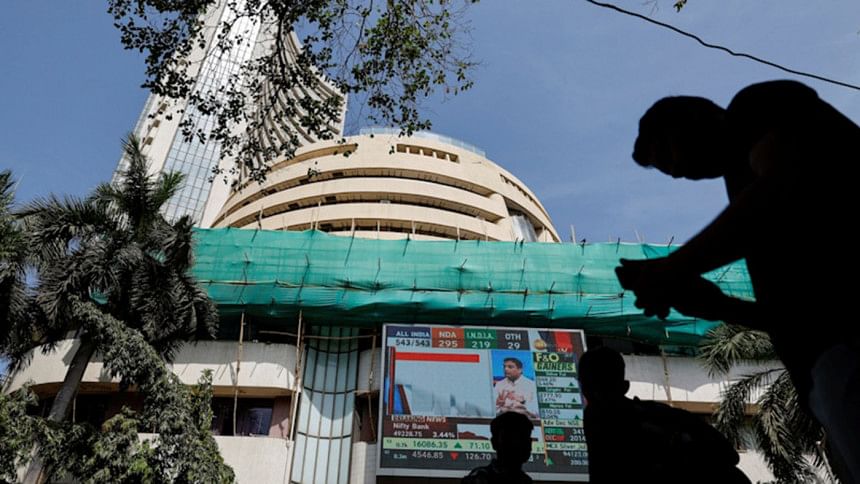
India's Nifty 50 recovered about 1,000 points off the day's low, last down 4.93% to 22,122.20, while the S&P BSE Sensex was down about 4.75% to 72,831.14, as of 2:04 p.m. IST.
"In our view, the important thing is that the NDA return to form the next government, which represents policy continuity," said Mike Sell, head of global emerging market equities at Alquity, London.
"Whether they win by 20 or 120 impacts the amount of structural reform that can take place, but ultimately a win is a win and the increasing positivity around the Indian structural growth story will be undiminished."
2:56pm, June 4
Which parties are ahead where
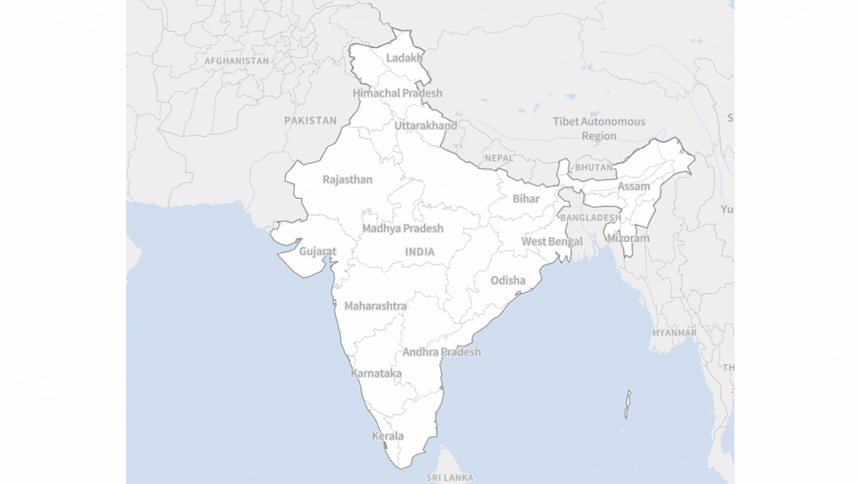
It is too early to predict a clear victory as counting of all the votes is still underway by the election commission.
Narendra Modi's ruling BJP was leading in nearly all the seats in Gujarat, Madhya Pradesh, Jharkhand, Karnataka, Assam and Chhattishgarh and Delhi.
The Congress party was leading in the states of Punjab and Kerala.
Regional party the Telugu Desam party was leading in Andhra Pradesh.
A political ally of Modi's party, the Janata Dal (United) was leading in Bihar state.
The local Samajwadi party allied with the Congress party was leading in 36 of the 80 seats in the bell weather Uttar Pradesh state.
In West Bengal, the firebrand chief minister Mamata Banerjee's Trinamool Congress party was leading in 36 of the 42 seats.
Source : Election Commission of India
2:22pm, June 4
Who is Narendra Modi?
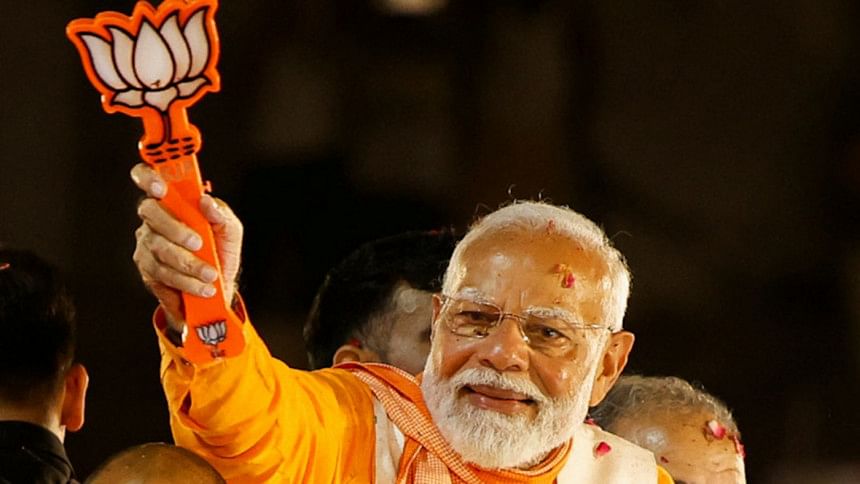
India's Hindu nationalist leader Narendra Modi is set to win his third term in a row as prime minister.
The 73-year-old will become the second leader in Indian history to do so, rivalling the country's founding leader Jawaharlal Nehru.
His alliance raced to a majority in early vote counting trends in the general election on Tuesday, although the numbers were well short of the landslide predicted in exit polls.
Victory would see him once again defeat Nehru's once-dominant Congress Party and great-grandson Rahul Gandhi.
In direct contrast with the historically secular Congress, Modi and his Bharatiya Janata Party (BJP) have consistently wooed India's majority Hindu community.
The BJP's populist measures including shepherding the building of a temple to the Hindu god Lord Ram on the site of a razed mosque, igniting a wave of religious fervour.
Modi's approval rating is 75%, the highest among 25 world leaders tracked by the U.S. data intelligence company Morning Consult.
Opposition leaders say another term for Modi could severely damage India's secular and democratic traditions, arguing that his Hindu nationalist agenda has polarised the country.
A slim majority for BJP - or having to depend on NDA allies for a majority - could introduce some uncertainty into governance as Modi has ruled with an authoritative hold over the government in the last decade.
1:40pm, June 4
How is a government formed?
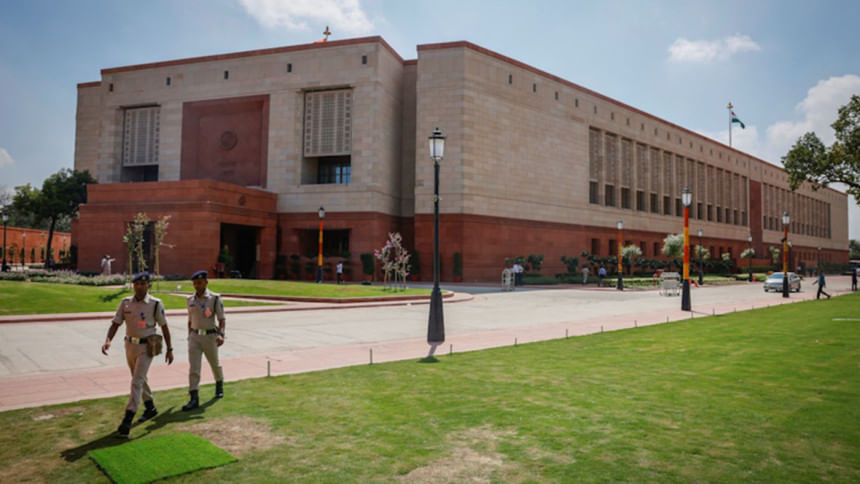
Results are announced for each constituency as soon as counting is completed.
India follows the first-past-the-post system, under which a candidate with the highest number of votes wins, regardless of garnering a majority or not.
Result trends generally become clear by the afternoon of counting day.
The official count from the the Election Commission of India (ECI) can come hours later.
After the ECI announces the results, the president invites the leader of the party, or an alliance, which has more than half the seats to form the government.
The party or coalition with 272 or more seats - a majority of 543 - then chooses a prime minister to lead the government.
If no political party or alliance gets a simple majority, leading to a "hung house", the president asks the party with the largest number of seats to form a government, and prove a majority on the floor of the house later.
The new lower house of parliament has to be in place before its current term ends on June 16.
1:38pm, June 4
Here's a graphic of India's election results over 60 years
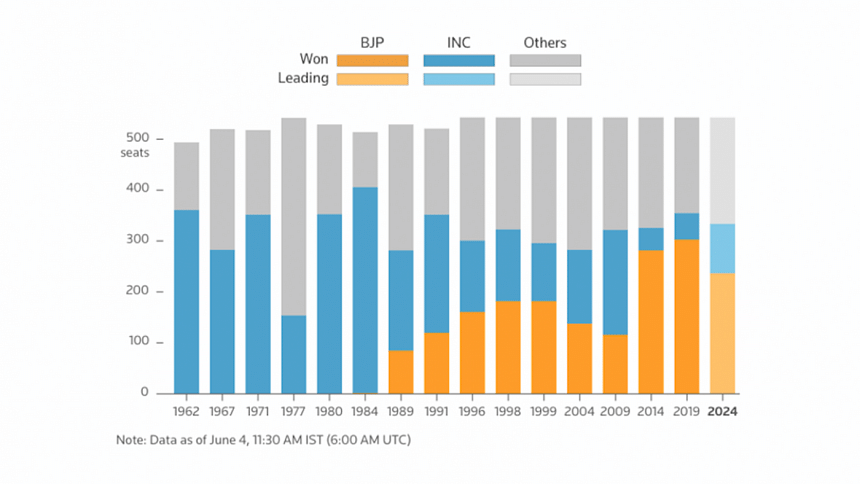
01:28pm, June 4
'400 at the moment certainly looks distant'
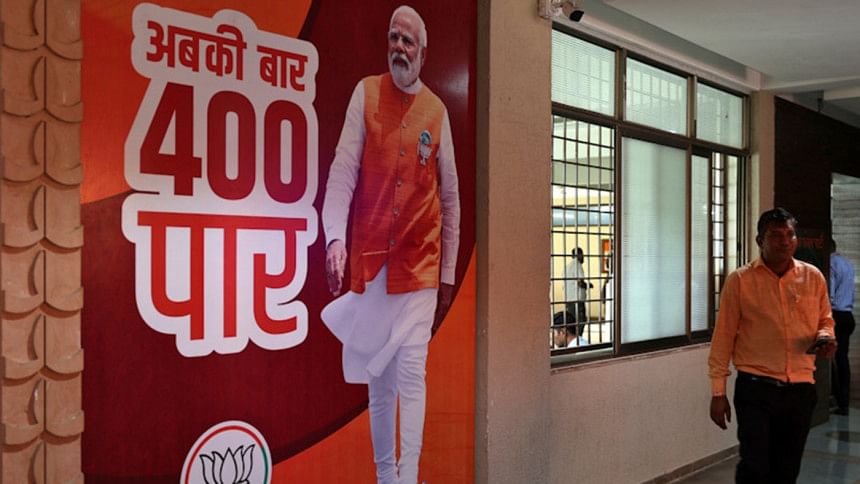
Exit polls had shown Prime Minister Narendra Modi and his Hindu nationalist Bharatiya Janata Party (BJP) would register a big victory.
They suggested its ruling National Democratic Alliance (NDA) would get a two-thirds majority or more.
But at 10.30 a.m. (0600 GMT), TV channels showed the BJP heading for 250 seats, well short of the 303 it won in 2019.
They suggested the wider alliance was ahead in nearly 300 of the 543 elective seats in parliament, where 272 is a simple majority
The opposition INDIA alliance led by Rahul Gandhi's centrist Congress party was leading in over 220 seats, higher than expected.
Slimmer majority?
A third Modi term with a slim majority for BJP - or having to depend on NDA allies for a majority - could introduce some uncertainty into governance as Modi has ruled with an authoritative hold over the government in the last decade.
In the run up to the election, Modi set an ambitious target of 370 seats for the BJP and 400-plus for the alliance.
"It's a fair assessment to say 400 at the moment certainly looks distant," BJP spokesperson Nalin Kohli told the India Today TV channel.
"But we need to wait...to have a final picture of the seats because the exit polls speak of a massive sweep, (and) the counting trends currently don't seem to match that," he said.
"The BJP-NDA will form the government, that trend is very clear from the start," he added.
01:02pm, June 4
Stocks plunge as polls show Modi's mandate slipping
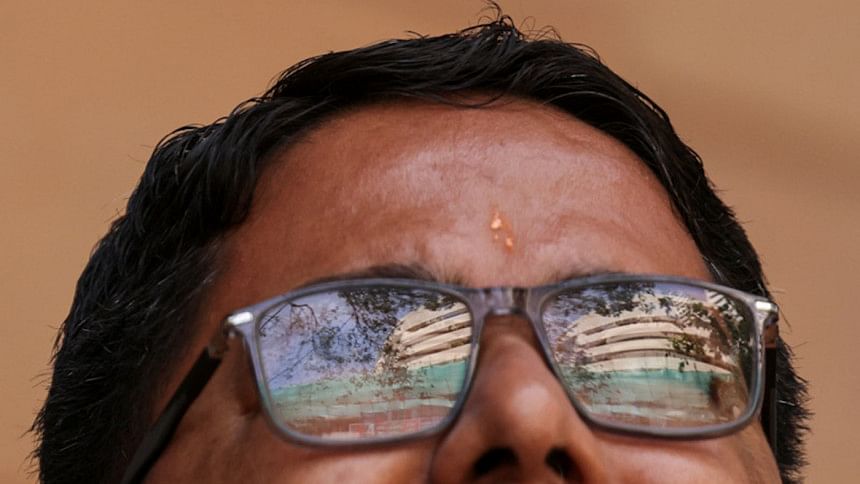
Indian stocks tanked the most in four years on Tuesday, as vote counting in the Indian election suggested Prime Minister Narendra Modi's Bharatiya Janata Party (BJP)-led alliance is unlikely to win an overwhelming majority as predicted by exit polls.
State-run firms were among the worst hit, with the Nifty PSE Index dropping as much as 14.7%. The Nifty PSU Bank index which tracks state-run lenders, was down 13.8% and headed for its worst day on record.
Meanwhile, fast moving consumer goods firms widely seen as defensive stocks, gained 0.3%, with Hindustan Unilever and Dabur India gaining about 5% each.
Consumption in FMCG and pharma will not change whichever government comes, so because they are defensive stock there is some amount of safety found during uncertain events," said Anita Gandhi, founder and head of institution at Arihant Capital Markets.
"FMCG companies have good distribution channels and generally command better valuations and are well-managed companies, so investors find some amount of safety in their stocks," she said.
"Relative valuations of FMCG and pharma companies look attractive because they did not participate in the recent rally and their stocks have been in a consolidation phase for the last year, so we see buying interest in the medium to short term," said Kranthi Bathini, director of equity strategy at Wealthmills Securities.
12:49pm, June 4
Market analysts on the early vote count
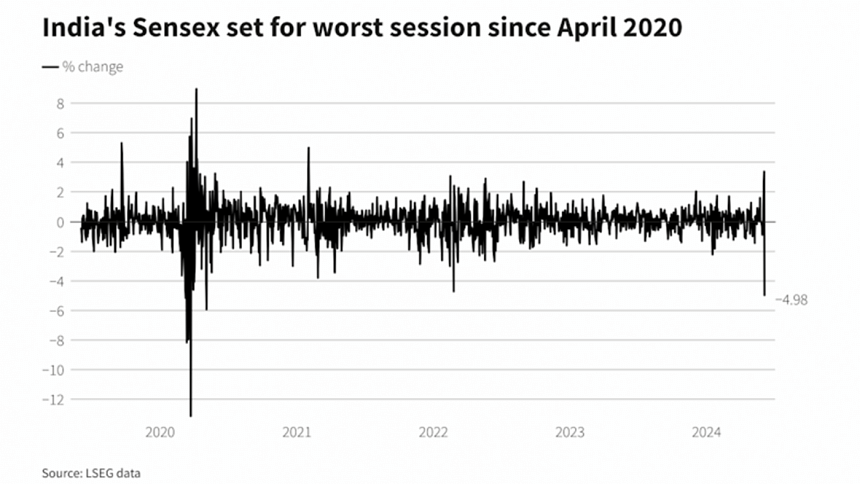
Umesh Kumar Mehta, chief investment officer, Samco Mutual Fund, Mumbai
"Markets have dropped today as they are now pricing in a likely change in governance structure because the current leads/trends hint at an alliance and not an absolute majority for BJP, which was the case in the last 10 years."
"If it is a National Democratic Alliance (NDA) coalition government, then markets will wait for the budget to get clarity. Till then, we expect markets to be in a state of flux and they will try to correct or settle down at or around these levels."
"I think markets have entered into a correction phase. The bull market that we had seen over the last year, that is now going to take a rest for a while."
"If there is a fractured mandate, we think markets should be further nervous. But so long as the current leadership and the Prime Minister stays, the drop will not be massive."
12:36pm, June 4
Modi's 'more than 400 seats' target
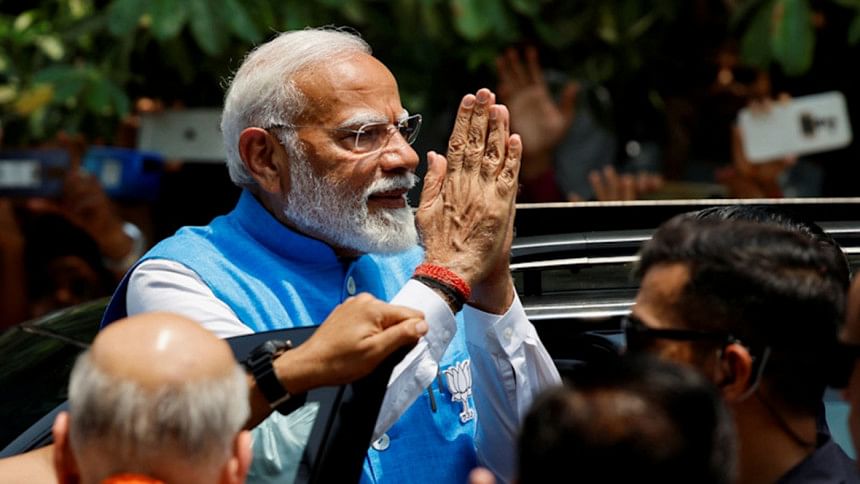
In the run up to the election, Prime Minister Narendra Modi set a target of 370 seats for his Hindu nationalist Bharatiya Janata party BJP and 400-plus for the National Democratic Alliance (NDA) it heads
He campaigned with the slogan "This time around, more than 400 seats."
Only once in Indian history has a party crossed the 400 mark - when the centre-left Congress party romped to victory following the assassination of its leader Indira Gandhi in 1984.
In 2019, the BJP-led National Democratic Alliance (NDA) won 353 seats, out of which BJP accounted for 303.
A summary of five major exit polls on Saturday projected the NDA could win between 353 and 401 seats. Three of the five polls projected BJP alone could win more seats than the last time.
The opposition "INDIA" alliance led by Rahul Gandhi's Congress party was projected to win between 125 and 182 seats. In 2019, The Congress party alone had won 52 seats, making it the second largest party in the lower house of the parliament.
12:34pm, June 4
Market volatility
Shares of government-owned banks, infrastructure and capital goods firms that gained sharply on Monday, saw the largest falls on Tuesday.
Monday's rally in markets was fed by optimism over the economic outlook under a fresh Modi-led government as predicted by exit polls.
The rupee dropped to as low as 83.4425 against the dollar versus its previous close of 83.1425. The benchmark 10-year bond yield was up 11 basis points at 7.05%.
12:01pm, June 4
Market moves
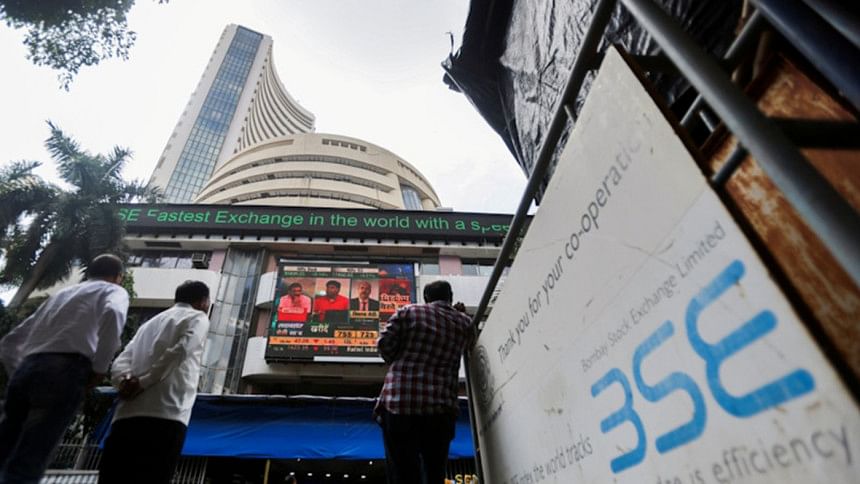
The NSE Nifty 50 index lost 5.02% at 22,102.20 points as of 11:12 a.m. IST, and the S&P BSE Sensex fell 5%, set for its worst session since April 2020.
The indexes fell as much as 3.7% earlier in the session, erasing all of Monday's gains after exit polls projected that the BJP-led alliance will likely get a two-thirds majority in the lower house.
Madhavi Arora , Lead economist, Emkay Global, Mumbai
"The margin of win could decide the aggressiveness of next leg of reforms in land, labour and capital."
11:56pm, June 4
Past Parliaments: From Congress era to rise of BJP
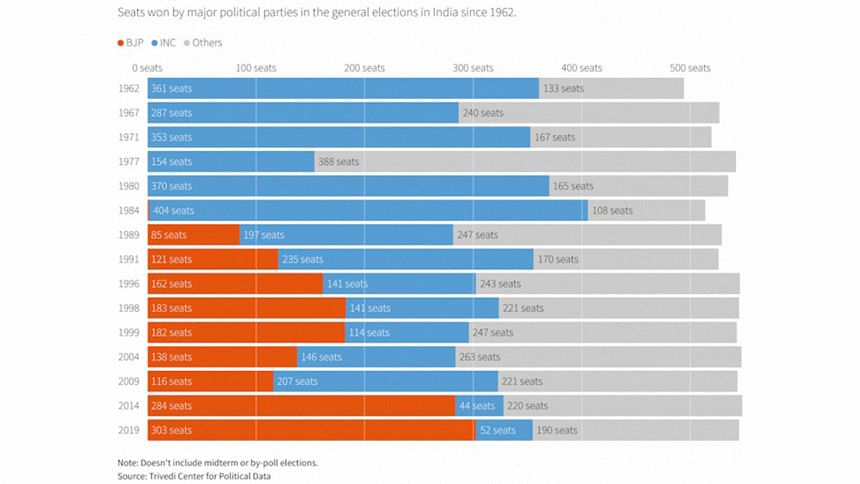
11:38am, June 4
Early Takeaway: Modi ahead but may fall short of a landslide
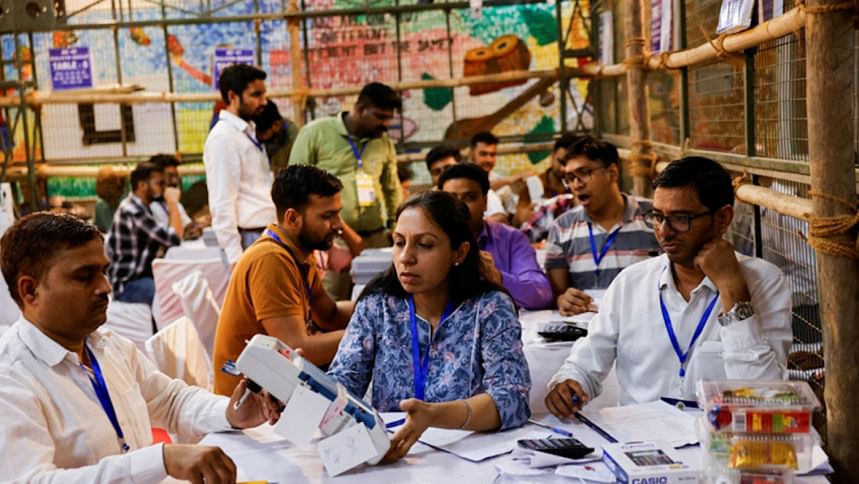
Indian Prime Minister Narendra Modi's ruling right-wing alliance raced to a majority in early vote counting trends in the Indian election on Tuesday.
But the numbers were well short of the landslide predicted in exit polls, TV channels showed.
The early see-saw trends unnerved markets with stocks falling steeply. The NIFTY 50 and the S&P BSE Sensex were both down 2.1% at 10:04 a.m. local time (0434 GMT).
The rupee also fell against the dollar and benchmark bond yields were up.
The markets had soared on Monday after exit polls on June 1 projected Modi and his Bharatiya Janata Party (BJP) would register a big victory, with its National Democratic Alliance (NDA) seen getting a two-thirds majority and more.
At 10 a.m. local time (0430 GMT), TV channels showed the NDA was ahead in nearly 300 of the 543 elective seats in parliament, in early counting.
The opposition INDIA alliance led by Rahul Gandhi's Congress party was leading in over 200 seats, higher than expected.
Only about 10%-15% of the total votes had been counted at the time, TV channels said.
The BJP alone accounted for nearly 250 of the seats in which the NDA was leading, compared to the 303 it won in 2019. Trends also showed Modi leading first, then trailing and leading again in his seat in the Hindu holy city of Varanasi.
Counting is expected to last several hours as the large majority of votes polled in electronic voting machines or EVMs are taken up after the first 30 minutes of counting postal ballots.
"These are very early trends, we are going to see better results as the day progresses," Congress spokesperson Pawan Khera said.
TV exit polls broadcast after voting ended on June 1 projected a big win for Modi, but exit polls have often got election outcomes wrong in India.
Disclaimer: Inputs are from Reuters

 For all latest news, follow The Daily Star's Google News channel.
For all latest news, follow The Daily Star's Google News channel. 









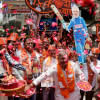

Comments